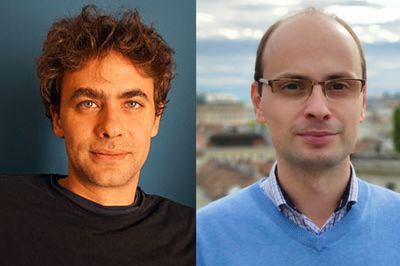
(Vienna, 31 October 2019) Arvand Haschemi and Dimitrios Tsiantoulas, employees at the Department of Laboratory Medicine of MedUni Vienna have obtained generous research grants for their studies from the European Research Area Network on Cardiovascular Diseases (ERA-CVD).
ERA-CVD is a European network comprising 24 partners from 19 different countries and regions and was commissioned to allocate grants by the current 'Horizon 2020' European Framework Programme for Research and Innovation.
Both research grants were awarded for studies in the field of atherosclerosis research. Atherosclerosis is a chronic inflammatory disease caused by high cholesterol and characterized by the formation of plaque deposits in large and medium-sized arteries. It is the cause of heart attacks and strokes.
Arvand Haschemi: The Role of the Pentose Phosphate Pathway on Myeloid Cell Activation and Atherosclerosis
Metabolic syndrome, which is associated with insulin resistance and hyperglycaemic states, is an important risk factor for atherosclerosis. Interestingly, the activation of immune cells is associated with increased glucose metabolism.An international consortia formed by research teams from France (Stoyan Ivanov, INSERM), Germany (Florian Kahles, University Hospital Aachen), the Netherlands (Jan Van den Bossche, Amsterdam UMC) and Austria (Arvand Haschemi, MedUni Wien) will investigate in an interdisciplinary project, how and under what conditions the metabolism of immune cells can influence their cellular function. The consortia will focus on the expansion and activation of myeloid cells in atherosclerotic plaques. The aim of this study is to gain a better understanding of cardiovascular diseases, taking account of the relationship between energy metabolism, immune cell activation and the formation of atherosclerotic plaques.
About Arvand Haschemi
Arvand Haschemi is associate professor and PI at the Department of Laboratory Medicine, Medical University of Vienna. He studied molecular biology at the University of Vienna and completed the Medical University of Vienna's CCHD PhD programme, as well as research fellowships at Harvard Medical School in Boston, USA. His lab is investigating novel molecular mechanisms of metabolism and their (patho-)physiological implications in humans.
Dimitrios Tsiantoulas: The role of B cell immunity in accelerated atherosclerosis (B-eatATHERO)
Numerous studies have shown that different types of immune cells can either inhibit or accelerate the development of atherosclerosis.Hitherto, too little significance has been ascribed to B cells, in particular. Dimitrios Tsiantoulas has been awarded the ERA-CVD grant to work with Amanda Foks (University of Leiden) and Julia Polansky-Biskup (Charité Universitätsmedizin Berlin) to investigate the molecular machinery that influences the B cell response in accelerated atherosclerosis. Various high-throughput techniques are to be used for preclinical and clinical investigations, in order to characterise the effect of B cells. The aim of the study is to identify innovative therapeutic approaches to prevent the recurrence of heart attacks, in the context of secondary prevention.
About Dimitrios Tsiantoulas
Dimitrios Tsiantoulas completed his PhD under the supervision of Christoph J. Binder at the Medical University and the CeMM Research Center for Molecular Medicine. After graduating, he worked as a post-doc funded by the British Heart Foundation in the group led by Ziad Mallat at the University of Cambridge. Since October 2019, he has been working at the Department of Laboratory Medicine at the Medical University of Vienna.